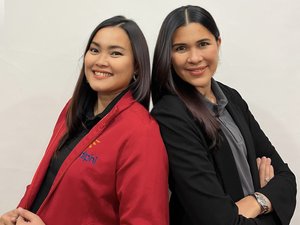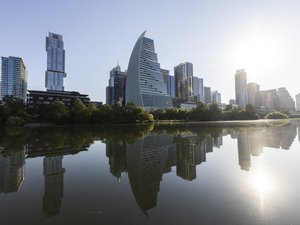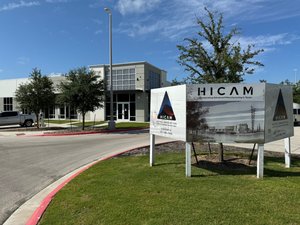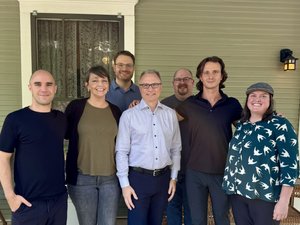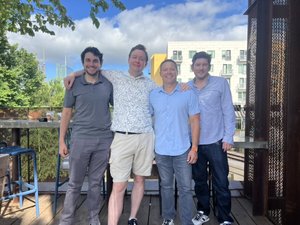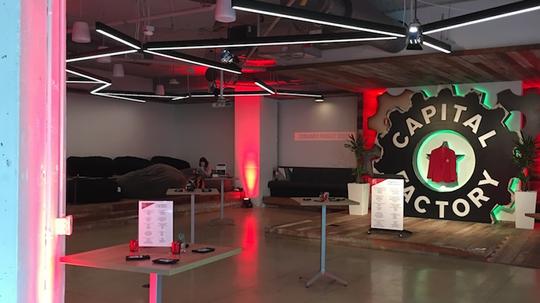
One of Austin's most active hives of startup activity is slowly moving toward its new normal.
Capital Factory has begun setting up its downtown coworking, collaboration and educational spaces for the Covid-19 era by removing some of its furniture and envisioning different, more separated spaces for startup teams and solo entrepreneurs.
Naturally, it's also tapping into some of its own members' technologies to help prevent the coronavirus from spreading as people slowly return to its spaces.
Capital Factory members and visitors will be greeted at entry points with free, disposable masks to help everyone comply with a requirement to wear them in common areas. There will also be thermal cameras, recently developed by Austin's Eagle Eye Networks and Athena Security, that will flag Capital Factory staff if someone walks in with an abnormal temperature.
While its safety practices will continually evolve, like so many things during the Covid-19 pandemic, Capital Factory founder and executive director Joshua Baer said member surveys and conversations indicate the reopening will be slow in these early days following the partial reopening of offices in Texas this week.
“It doesn’t seem like there’s going to be a huge rush of people to come back in to the office in our type of community,” he said. "Even if we were to say tomorrow: 'everything's open, everybody come in, no restrictions,' it's not like we think we'd suddenly be overwhelmed with people coming in. A lot of people would still choose to stay at home."
That said, Baer thinks many members are comfortable coming into the office with safety measures and spacing in place. Capital Factory, which furloughed 33 employees in late March, has about 80,000-square-feet of space that, pre-Covid, had about 1,000 people moving through each day. These days, it's more like 10-20 people per day.
Meanwhile, Capital Factory has increased the frequency of cleaning in its spaces and using more effective products -- as well as keeping doors open, reducing touch points and putting markings on the ground to help people know where to go to keep distance.
Baer said Capital Factory would potentially ban members who don't follow the new safety measures. But he doesn't expect major issues.
"Like with anything, we want to try to work with people," he said. "Most people have good intentions and want to do the right thing. And there will certainly be a good amount of positive peer pressure to do the right thing and to wear a mask."
The organization has also started looking at different rooms with closer seating and fewer restrictions for people who have tested positive for antibodies that would be present if they've already had Covid-19 and are likely immune for a while.
But it's along road ahead, and Baer said he expects to see a lot of innovations and new best practices emerge in the months and, maybe, years ahead.
“I don’t think this problem is going away," he said.
Manufacturing masks
Serial entrepreneur Lloyd Armbrust has taken on the daunting task of manufacturing surgical and N95 masks. And it's no easy feat to bring a tech startup mindset to a manufacturing process that is still largely done by hand overseas.
“It’s so different producing physical things than digital things," he said.
But masks are one of the most effective ways of preventing the spread of coronavirus, and Armbrust saw a path to quickly start making them in the U.S. instead of trying to source them from China.
Armbrust American is working with several vendors to bring separate pieces together to be assembled by software-driven robotics. After quickly securing the machines and developing software, it will be able to make about 1.2 million masks a week and offer them at the same price as Chinese suppliers.
Armbrust, who previously founded OwnLocal, financed the Amrbrust American mask company through a royalty model and has had about $5 million committed from angel investors, including some who were looking at other ways to source masks for businesses.
Baer said the masks are one of the keys for businesses like Capital Factory to reopen safely.

Tracking the virus
Tarun Nimmagadda is CEO of Austin construction logistics software startup Rucket and previously founded Mutual Mobile. He wasted little time in taking on one of the most crucial aspects of the pandemic -- contact tracing. And he and his team have developed separate efforts for an app to serve as a health passport and another that provides scores for restaurants, grocery stores and other high traffic locations.
After 15 days of rapid development, his team of about 500 volunteers launched the nonprofit CoronaTrace to notify people if they've crossed paths with someone who wound up sick. It was quickly distributed to about 1,000 people in New York City.
Nimmagadda and his team planned to launch it on Apple's App Store. But, like many other technologists, he hit a brick wall of Big Tech resistance and government red tape when it came to contact tracing, which has raised some privacy concerns because of how it uses location data.
He said government officials indicate they want specific apps for each state -- or even each city.
"Honestly, I think they just went way overboard on privacy and made life difficult for everyone," he said.
Despite frustrations with Apple and Google, as well as the government, he's getting closer to locking in agreements to have a contract tracing app live for users this week -- with potential agreements in Texas, Oklahoma, New Jersey and Kentucky.
"What is certain is this is going to be a fragmented approach," he said, noting overwhelmed government agencies are already stretched thin in their response to the pandemic.
Nimmagadda sees CoronaTrace as a way to bring a coalition of companies together under the nonprofit to help develop and manage the effort. It's already working with TaskUs and Mutual Mobile, among others who are donating time and resources.
“This takes a village," he said. "To think that any one company can tackle this is foolish.”
The app has exposure notifications, tools to help manual contract tracers, a feature for scoring restaurants on safety scores and a way to integrate records with testing centers to develop a health passport.
Capital Factory will ask its members to install the app and use it to help track and prevent new infections by making it easy for anyone who tests positive to anonymously alert people they've recently been around.
Monitoring temperatures
Dean Drako's Eagle Eye Networks has been working on specialized surveillance cameras and software for years. While its been more oriented toward preventing and responding to violence in schools, it has taken on a new opportunity -- quick checking people's temperature with a specialized thermal camera as they enter a building and flagging staff if someone is running an abnormal temp.
When someone has a high reading, staff will ask them if they're feeling OK and if there could be another reason for their high temp before taking another manual forehead temperature check. If they continue to show high temps, they would be asked to go home.
Eagle Eye Networks' thermal camera works in tandem with a visible spectrum camera that can differentiate between a face, where temperatures are taken, and other objects, such as a coffee cup. It also has a calibration unit that stays at a fix temperature to ensure temperature accuracy.
Drako said the cameras might have some difficulty when someone comes in on a hot day after a run and their temperature is elevated -- or in the winter when someone is wearing a stocking cap and a face mask. But, in the demo with Inno, it even captured a brief temperature from someone with a mask, glasses and a hat.
He said the readings are probably 99% effective, which has the potential to significantly reduce the number of people who enter the building with an elevated temperature. To be even more accurate, they could require people to stand in one place for a few seconds without a hat or other obstructions to get a more accurate reading.
While he expects some pushback from a small number of people, most probably won't have any issue with having their temperature checked going into buildings.
“I think the general trend in our society is people are willing to forego privacy for safety,” he said.
Baer, meanwhile, said the technology will likely make many people feel safer -- just as security measures at airports made many people feel safer after the 9/11 attacks. To that end, he said Capital Factory plans to have a TV display showing the temperatures as they're taken, so everyone can see it in action as they walk through the camera areas in lobby areas.
"Partly, we need to solve the problem," he said. "That's an important part of it. But the other part is how do we make people feel safe coming in?"
